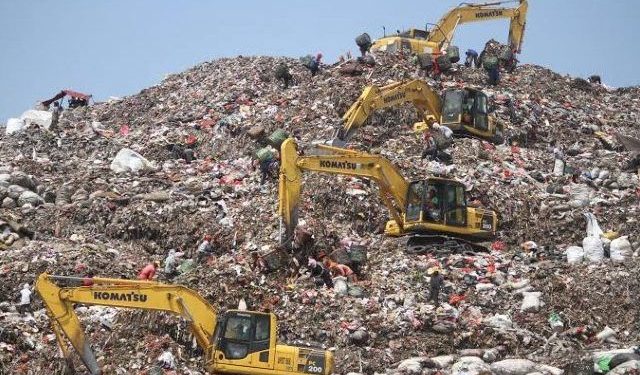Surabaya, Indonesia Sentinel — The city of Surabaya has become a model for innovative waste management, drawing the attention of Indonesia’s central government. Every day, Surabaya transforms 1,000 tons of trash into electrical energy, a groundbreaking effort in urban waste management.
Surabaya Mayor Eri Cahyadi revealed that approximately 1,600 tons of waste are sent daily to the Benowo Landfill (TPA Benowo). However, instead of being a burden, this waste is converted into a valuable energy source.
“All the waste produced daily can be processed into electrical energy. Of the 1,600 tons of trash collected each day, 1,000 tons are turned into electricity, while the remainder is processed using other methods,” Eri stated on Wednesday, January 8, as reported by JawaPos.
Advanced Technology Drives Efficiency
The Benowo Landfill employs two key technologies to manage the city’s waste effectively. Organic waste is processed through fermentation, which powers a landfill gas-to-energy plant. Non-organic waste is handled using thermochemical technology in a gasification power plant.
Eri explained that these technologies have proven highly effective in addressing Surabaya’s growing waste challenges. “The city’s daily waste production has risen from 1,300 tons to 1,400 tons and now to 1,600 tons, as Surabaya’s population has grown from 2.8 million to 3.2 million,” he said.
Despite the increasing waste output, Surabaya’s waste-to-energy system ensures zero waste while generating electricity, Eri noted.
The city’s innovative waste-to-energy approach has been recognized by Indonesia’s Ministry of Environment and Forestry (KLHK). Surabaya is also doubling down on its commitment to sustainable waste management through the implementation of the 4R principles: Reuse, Reduce, Recycle, and Replace.
Each neighborhood association (RW) now operates its own waste bank to sort and recycle materials. “Every RW now has a waste bank to manage and process waste. We hope this will reduce the daily waste volume from 1,600 tons to 1,400 tons,” Eri said.
With its waste-to-energy initiatives and community-driven programs, Surabaya continues to set a precedent for sustainable urban development in Indonesia.
National Adaptation and Goals for the Future
According to Suarasurabaya, Indonesia’s central government plans to adopt Surabaya’s innovative waste-to-energy program for nationwide implementation. The plans was announced by the Coordinating Minister for Food Affairs, Zulkifli Hasan.
During a visit to the Benowo Landfill in Surabaya on Tuesday, January 7, 2025, Zulkifli emphasized the importance of this initiative. “I believe this is the solution to addressing waste management issues everywhere,” he said.
East Java Closes 3 Livestock Markets Amid Foot-and-Mouth Disease (FMD) Outbreak
The minister highlighted the urgency of scaling up such programs, citing the country’s growing population and corresponding increase in waste production. “With our economy growing and the population increasing, waste is naturally increasing as well,” he noted.
The waste-to-energy model in Surabaya has been praised for its efficiency in tackling urban waste challenges, converting significant amounts of trash into electricity while promoting sustainability. The central government aims to replicate its success across the nation to address Indonesia’s mounting waste management needs.
(Raidi/Agung)

























